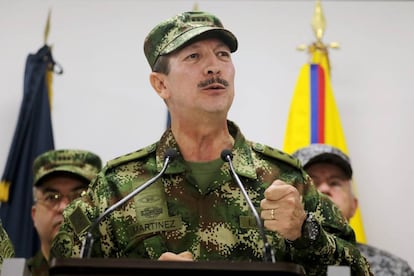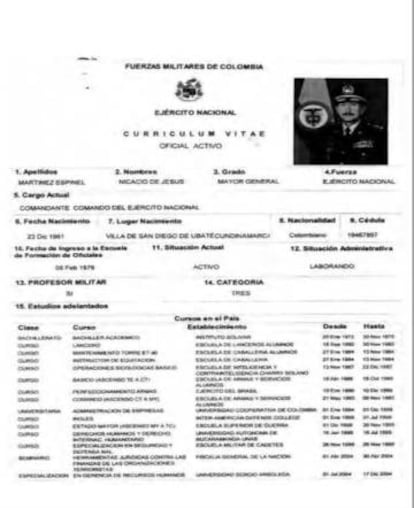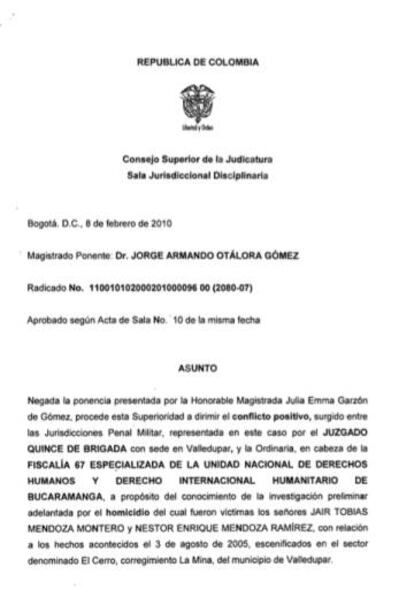New Colombian army chief led brigade probed for killings during civil war
Documents seen by EL PAÍS shed more light on the allegations involving General Nicacio de Jesús Martínez Espinel, which date from the conflict with FARC guerrillas


Investigations are underway in Colombia over alleged abuses committed during the long-running civil conflict that officially ended in 2016 with the signing of a peace deal between the government and the Revolutionary Armed Forces of Colombia (FARC). The military have been linked to killings of civilians to boost body counts and meet quotas during the fight against the armed insurgency.
Prosecutors are investigating killings by forces under the command of officials who have recently been promoted by the Colombian government. One of these is General Nicacio de Jesús Martínez Espinel, who was appointed top army commander in December.

Between October 2004 and January 2006, Martínez Espinel held a top post in a brigade that is being investigated by prosecutors for at least 283 alleged extrajudicial executions in the Caribbean departments of La Guajira and Cesar.
At least 23 of the cases under scrutiny date back to the period when the general was second-in-command of the 10 Brigade. Documents shown to EL PAÍS by sources close to the investigation into so-called “false positives” (killings of innocent civilians who were later portrayed as armed insurgents) described court trials that shed light on the activities of this brigade. Martínez Espinel says he only served in an administrative capacity.
On Wednesday, the Colombian Senate is due to back his appointment as top army commander, a position he was awarded by President Iván Duque in December.
In May of this year, The New York Times reported on new army guidelines recently issued by General Martínez Espinel pressuring officers to improve the results of their operations against remaining guerrilla and paramilitary groups in the country. These orders have caused concern among some officers due to the renewed risk of innocent civilian deaths, as occurred in the mid-2000s.

As a result, last week the Office of the Inspector General of Colombia, an oversight agency for public officials, launched an investigation into these recent guidelines and “the alleged implementation of an internal army policy that could be similar to the one that triggered the so-called ‘false positives’.”
Leader in deaths
Documents seen by EL PAÍS show that the 10th Brigade is mentioned in a report by former Attorney General Eduardo Montealegre Lynett (2012-2016) as occupying “one of the top positions in the ranking of alleged extrajudicial executions” that took place during the civil war.
The cases reported in 2005, under the presidency of Álvaro Uribe (2002-2010), implicate at least two battalions from this brigade in extrajudicial killings, a massacre of indigenous people, and sexual violence.

On February 21, 2005 the soldiers of La Popa battalion of the 10th Brigade participated in two homicides in partnership with the now-defunct paramilitary group Autodefensas Unidas de Colombia, a court ruling shows.
On May 12, 2005 two soldiers from this same battalion stationed in Cesar department killed a protected individual, Dagoberto Cruz Cuadrados, who was “later presented as dead in combat.” Twelve years later, a prosecutor reopened the case and ordered the arrest of those responsible, who had left the army by then.
And on May 14, 2005 around 30 soldiers from La Popa participated in the murder of Claudino Manuel Olmedo Arlante and Frank Enrique Martínez Caviedes, the latter a minor with a mental disability. Both were also presented as dead in combat. Seven soldiers received 40-year prison terms for those killings.
Documents seen by EL PAÍS show that on August 5, 2005 the current army chief signed an order for a reward of a million pesos (around €260) for information that yielded “excellent results” against alleged insurgents.
This newspaper got in touch with the Colombian government and Martínez Espinel’s team, which has so far declined to comment. In a release, the army notes that “the commander of the army is facing no investigation, sanction or obstacle from prosecutors, the military penal justice system or the Special Jurisdiction for Peace over human rights issues that might prevent him from holding public office.”
Political storm
Martínez Espinel’s promotion to army head has triggered a political storm in Colombia. The general has always held that he respected human rights and that he only had administrative duties during the period that he served with the 10th Brigade.
The documents seen by EL PAÍS do not specifically link him to any operation prosecuted in the courts. But all of them took place while he was second-in-command.
On January 21, 2006, two days before Martínez Espinel left the brigade, a group of his soldiers killed Javier Pushaina, Luis Ángel Fince Ipuana and Gaspar Cambar Ramírez; wounded Gustavo Palmar Pushaina and Moisés Pushaina Pushaina, and sexually assaulted Irene López Pushaina and Ligia Cambar Ramírez, according to the prosecution. This case was admitted by the Inter-American Court of Human Rights.
English version by Susana Urra.
Tu suscripción se está usando en otro dispositivo
¿Quieres añadir otro usuario a tu suscripción?
Si continúas leyendo en este dispositivo, no se podrá leer en el otro.
FlechaTu suscripción se está usando en otro dispositivo y solo puedes acceder a EL PAÍS desde un dispositivo a la vez.
Si quieres compartir tu cuenta, cambia tu suscripción a la modalidad Premium, así podrás añadir otro usuario. Cada uno accederá con su propia cuenta de email, lo que os permitirá personalizar vuestra experiencia en EL PAÍS.
¿Tienes una suscripción de empresa? Accede aquí para contratar más cuentas.
En el caso de no saber quién está usando tu cuenta, te recomendamos cambiar tu contraseña aquí.
Si decides continuar compartiendo tu cuenta, este mensaje se mostrará en tu dispositivo y en el de la otra persona que está usando tu cuenta de forma indefinida, afectando a tu experiencia de lectura. Puedes consultar aquí los términos y condiciones de la suscripción digital.








































